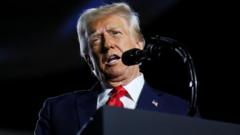The recent diplomatic tensions between the US and Colombia regarding deportation flights have been alleviated following an agreement that allows the US military deportation flights to land in Colombia from now on.
US and Colombia Resolve Tariff Dispute Over Deportation Flights

US and Colombia Resolve Tariff Dispute Over Deportation Flights
Colombia agrees to accept deported migrants from the US without limitations, preventing tariffs.
On Sunday, following a blockade of US military deportation flights by Colombian President Gustavo Petro, tensions escalated as Donald Trump threatened a hefty 25% tariff on all Colombian goods. The standoff arose after Petro insisted that deported migrants be returned on "civilian planes, without treating them like criminals."
However, the situation has shifted as the White House confirmed that Colombia has now consented to accept deportees arriving on US military aircraft "without limitation or delay." Alongside this agreement, Colombia has secured assurances from Washington that repatriated citizens will be treated with dignity and respect.
Initially, Trump had ordered immediate "urgent and decisive retaliatory measures", which included tariffs and visa sanctions, spurred by Petro's refusal to allow the military flights. Petro did not shy away from countering Trump's stance in a public post, emphasizing Colombia's strength and heritage. He proclaimed on social media, "Your blockade does not scare me, because Colombia, besides being the country of beauty, is the heart of the world."
The rapid resolution to the conflict indicates a commitment from both sides to maintain diplomatic relations. As a precautionary measure though, Trump's proposed tariffs remain "fully drafted" and could be enforced if the agreement is not honored by Colombia. Additionally, visa sanctions and enhanced inspections on Colombians at the US border will remain until the first deportation flight successfully arrives back in Colombia. The agreement showcases a notable diplomatic maneuvering aimed to stabilize relations between the two nations amidst a challenging immigration landscape.
However, the situation has shifted as the White House confirmed that Colombia has now consented to accept deportees arriving on US military aircraft "without limitation or delay." Alongside this agreement, Colombia has secured assurances from Washington that repatriated citizens will be treated with dignity and respect.
Initially, Trump had ordered immediate "urgent and decisive retaliatory measures", which included tariffs and visa sanctions, spurred by Petro's refusal to allow the military flights. Petro did not shy away from countering Trump's stance in a public post, emphasizing Colombia's strength and heritage. He proclaimed on social media, "Your blockade does not scare me, because Colombia, besides being the country of beauty, is the heart of the world."
The rapid resolution to the conflict indicates a commitment from both sides to maintain diplomatic relations. As a precautionary measure though, Trump's proposed tariffs remain "fully drafted" and could be enforced if the agreement is not honored by Colombia. Additionally, visa sanctions and enhanced inspections on Colombians at the US border will remain until the first deportation flight successfully arrives back in Colombia. The agreement showcases a notable diplomatic maneuvering aimed to stabilize relations between the two nations amidst a challenging immigration landscape.



















